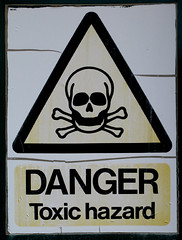Is Your Client Poisoning You?

“There is nothing either good or bad but thinking makes it so” - Hamlet, W. Shakespeare
Recently I took part in a conversation on a LinkedIn forum for EFT Practitioners. The thread discussion was started by the question -" I am just curious, what everyone does for themselves to protect their energy or clear themselves before and after a session?".
There were lots of different answers to this question. All sorts of suggestions were put forward involving “energy protection”, herbal remedies, cleansing rituals, invocations and “divine” protections of one sort or another.
I was intrigued by the question because, although I use EFT, I don’t think of client sessions in terms of good or bad energy.
In my opinion the idea that clients have positive or negative energy that you have to protect yourself from has a lot of drawbacks.
From the original question and some of the answers, I think you can distill out the following underlying presuppositions for this way of thinking:
- There is negative and positive energy.
- Therapists work with these energies that the client brings.
- Negative energy is bad (for them and for you).
- Positive energy is good (for them and for you).
- Clients can leak negative energy which gets on to you and must be protected against.
From some of the answers you might think that the client was slopping negative energy around like poison from a bucket, which is what the therapists need to be protected from.
Let’s imagine that you are a client of a therapist who is operating from this point of view.
After a few minutes of working with this therapist you begin to get the sense that you are making them uneasy in some way. It’s as if they act like you are contaminated with something that they really don’t want to have anything to do with.
This could all be going on at an unconscious level for both of you. You might just have the feeling that there is something wrong without knowing why.
How would that make you feel?
If it was me, I would start to worry that there was something else that was wrong with me. Since people often come to therapy because they think there is something intrinsically wrong with them, having that confirmed at an (un)conscious level is probably not going to be very helpful to the progress of the therapy.
It gets worse.
Many clients often work hard to protect their therapists from their “bad” stuff. So as a client I might have to start monitoring what I was sharing so as not to alarm or upset the therapist.
From this therapist’s point of view they might feel they need protection from this client, or their negative energy is going to go all over them and be harmful to them.
Now you have two people in a mutually defensive posture that they may not even be aware of.
Does this sound like a recipe for success?
What’s an alternative?
This is my working hypothesis about therapy:
The client has experiences, feelings, thoughts and behaviours that are unhelpful to him or her. They are not “negative” or “positive” in any metaphysical sense, just unhelpful to them and those around them.
This constellation of experience, feelings, behaviours and thoughts belongs to them. They are unique to that individual. While their effects can be felt by those around them, that constellation belongs to the client.
Likewise, as a therapist I have experiences, thoughts, ideas, feelings, behaviours that belong to me.
In an ideal world I can be present to the client with all their stuff, however difficult it may be.
In an ideal world I’m not afraid of anything that they bring and I recognise that it is all theirs.
“I realise there’s something I do before I start a session. I let myself know that I am enough. Not perfect. Perfect wouldn’t be enough. But that I am human, and that is enough. There is nothing that this man can say or do or feel that I can’t feel in myself. I can be with him. I am enough’ - Carl Rogers
It’s not an ideal world.
In the real world, parts of their stuff may trigger parts of my stuff.
However, I recognise that my reaction to their stuff belongs to me not them. Afterwards I do work to dismantle those unhelpful reactions in me (this is why ongoing self-development and clinical supervision is so important for therapists).
From my client’s point of view I hope they sense:
- That I accept them and their distress fully. I may not like it, but I’m not afraid of it or them.
- That they can go wherever they need to go to get the results they want. They don’t have to look after me because I am not scared of what they bring. (This is not to dismiss realistic precautions for you and your clients physical safety - some clients can do scary, dangerous things)
From this perspective I don’t feel under threat and I don’t have to be scared of my clients inner world.
So is your client poisoning you? No I don’t think so.